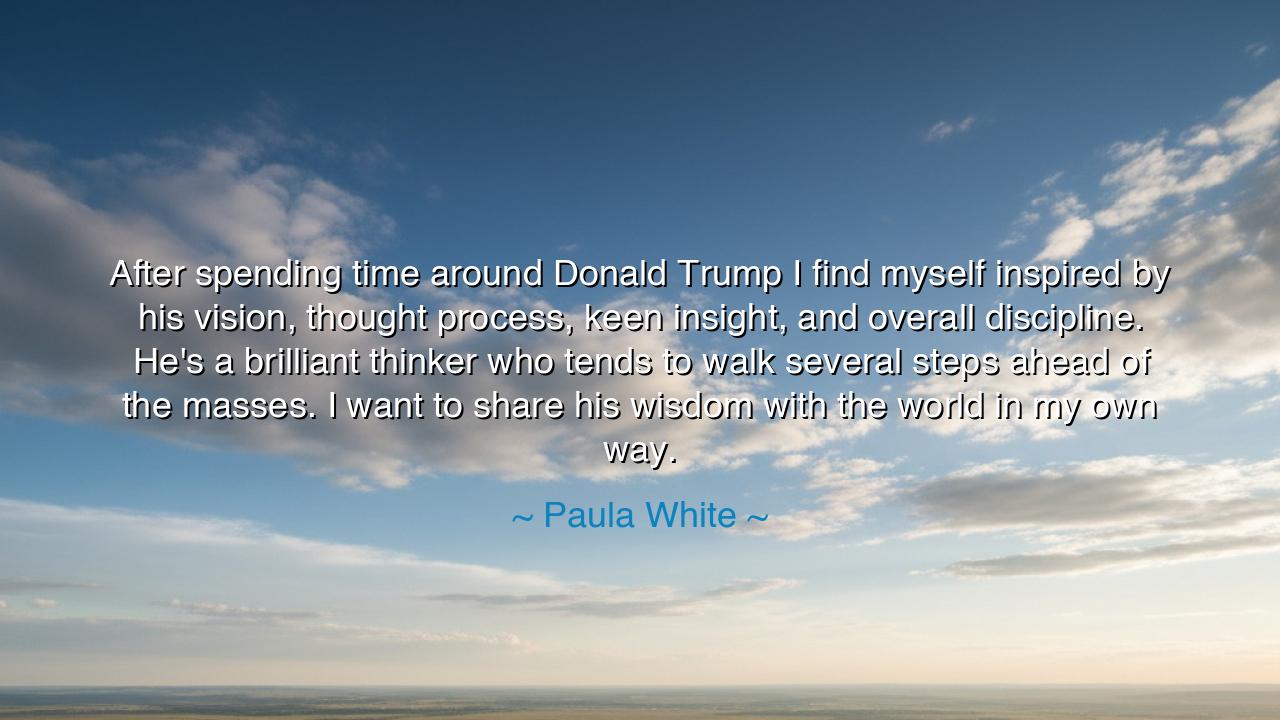
After spending time around Donald Trump I find myself inspired
After spending time around Donald Trump I find myself inspired by his vision, thought process, keen insight, and overall discipline. He's a brilliant thinker who tends to walk several steps ahead of the masses. I want to share his wisdom with the world in my own way.






Hearken, O children of discernment, to the reflection of Paula White, who speaks of the inspiration drawn from witnessing the vision, thought process, keen insight, and overall discipline of a man she deems a brilliant thinker. She observes that some minds move with swiftness and clarity beyond the grasp of the common multitude, walking several steps ahead of the masses. Herein lies a teaching for the ages: to recognize and learn from such minds is to gain access to their wisdom, which can guide, shape, and illuminate the path of others.
The origin of this reflection is rooted in White’s experience as a spiritual leader and observer of human endeavor. In spending time with Donald Trump, she discerned qualities that inspired admiration: a mind honed by ambition, discipline, and the capacity to foresee outcomes that elude ordinary vision. Her insight emphasizes the value of studying those whose intellect and strategic thought surpass the ordinary, translating their observations into guidance for others.
The meaning of this aphorism is profound: true wisdom is not always born of age or virtue alone, but of the combination of vision, insight, and disciplined thought. By observing and understanding those who navigate complexity with foresight, one may cultivate one’s own discernment, learning to anticipate, to act with clarity, and to influence the course of events more effectively. Inspiration arises when reflection meets opportunity.
History provides vivid testimony to this principle. Consider Alexander the Great, who surrounded himself with philosophers, strategists, and mentors such as Aristotle, learning from their vision and insight. By absorbing their wisdom, Alexander was able to achieve feats far beyond what ordinary men could imagine, guiding armies, founding cities, and shaping cultures. Here, the student of brilliance becomes a conduit for knowledge, translating insight into enduring impact.
Moreover, this teaching extends to all who seek growth. The disciple, apprentice, or observer who studies the strategies, habits, and reflections of the remarkable gains tools for their own advancement. Paula White’s words remind us that sharing wisdom is not merely imitation, but the conscious act of translating insight into action, molding it to one’s own abilities and circumstances, and passing its benefits to others.
O generations yet unborn, take this counsel into your hearts: recognize the minds that walk ahead, discern their vision, and cultivate your own understanding through reflection and application. Let the wisdom of those you study inspire you, shape your judgment, and guide your actions. For in learning from the brilliance of others, and in sharing that insight with the world, you honor both the teacher and the eternal pursuit of human understanding.






TTThanh Tran
Reading this, I feel compelled to consider the role of public figures in shaping personal inspiration. Is White motivated by genuine strategic brilliance, spiritual alignment, or a combination of factors? I also question how one discerns which elements of someone’s thought process are worth emulating. The statement highlights the tension between personal admiration and the broader consequences of promoting a public figure’s ideas, encouraging reflection on discernment, influence, and responsibility.
MTmai tinh
I’m intrigued by the idea of walking ‘several steps ahead of the masses.’ Does this suggest a kind of visionary leadership, or could it imply detachment from broader societal realities? I also wonder whether the qualities White admires—discipline, insight, vision—can be separated from political or ethical controversies surrounding the individual. The quote prompts me to think about how admiration of skill or intellect can coexist with critical evaluation of character and actions.
PTPhuong Truong
This statement sparks reflection on influence and mentorship. I wonder whether White’s goal of sharing his wisdom could be interpreted as amplifying his ideology or as a more neutral appreciation of strategic thinking. Does admiration for someone’s intellect justify public endorsement of all their actions? It also makes me question how charisma and perceived foresight shape public perception, and how critical evaluation interacts with personal inspiration.
A805.Vu Hong Anh 8A1
Reading this, I feel curious about what specific qualities Paula White sees as valuable in Trump’s vision and thought process. Does she mean strategic thinking, leadership skills, or something else entirely? I also wonder how much her own perspective and values shape the admiration she expresses. It raises questions about how individuals interpret brilliance and whether such praise reflects objective assessment or personal alignment with beliefs and goals.